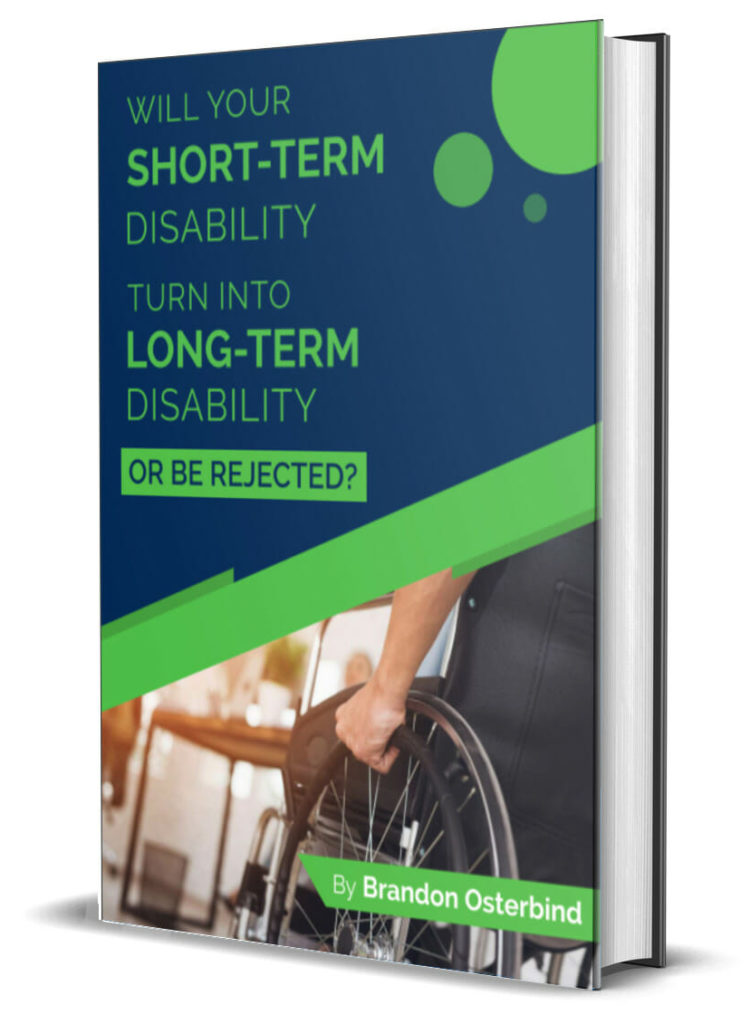Did Prudential Insurance Company deny your ERISA long-term disability claim?
We will review your denial letter for free and give you a detailed review of what you need to do to win your claim.
Upload your denial letter
👇
👆
Give us two business days to review your denial letter and send us an email that you uploaded it.
The truth is that you have a lot of work to do in the few days before your appeal is due.
You may not be able to get all the paperwork ready for an effective long-term disability & ERISA appeal if Prudential denied your claim.
Prudential denies claims even when claimants produce enough evidence or proof of physical disabilities preventing them from working as usual.
They say, that is not enough.
You are going head-to-head against some powerful companies who can make life hard on you.
So let me show you exactly what happens next:
Let us review your denial letter from Prudential! I’m sure you’re wondering, what can a lawyer really do for me?
Here is our promise: we will give you a strategy to win your long-term disability claim for FREE!
Prudential knows that if it denies your long-term disability & ERISA claim, most people would have a difficult time getting all of the right paperwork ready to file a successful appeal.
That is why they do it.
Because if they deny your claim, you cannot successfully appeal, then they don’t have to pay your claim.
They do this knowing that you are disabled. They know you are applying because you are physically unable to work. And yet they expect you to present an appeal as if none of that were true.
You only get one shot and your stakes are high. And, your one shot has to be completed within 180 days of your denial letter. So if you intend to wait around, you may just lose your case altogether. But if long-term disability benefits are your only option to provide for your family, then you need to start thinking about your next steps now.
Unlike so many other cases in Virginia, ERISA long-term disability cases have short deadlines and require you to act quickly.
What is an ERISA Disability Policy?
ERISA stands for the Employee Retirement Income Security Act. It is a series of federal statutes that govern benefit plans that Employers offer to their employees. These statutes control health insurance, dental insurance, vision insurance, 401k’s, and short-term/long-term disability insurance. The rules are strict and federal courts are unforgiving. They do not give the claimant the benefit of the doubt; instead, the courts treat both sides the same, often to the claimant’s detriment because you did not have a lawyer helping you through the process.
If you are applying for long-term disability in Virginia, that usually means you have been diagnosed with a significant injury.
Perhaps you have been diagnosed with chronic fatigue syndrome, musculoskeletal problems such as back injuries, cardiovascular diseases like heart failure or coronary artery disease, cognitive impairments like a traumatic brain injury, respiratory diseases like asthma or COPD, or maybe even cancer.
These diagnoses are difficult. They require significant treatment and sometimes they require a significant amount of rest.
At this point, you can do three things:

DO NOTHING
If you are defeated, you can stay down and lose the right to pursue your claim at all in the future. By not doing anything or waiting too long, it will be too late to accomplish any degree of success.

HANDLE THE APPEAL ON YOUR OWN
You can work up your appeal on your own. Just fill out the insurance company's limited forms and hope for the best. You should know that the insurance company has more resources and knowledge about how these claims are resolved. At the end of the day, this may cost you.

HIRE AN ATTORNEY
An attorney should be able to review your medical records, job description, and educational and training history to tell you what your chances of success may be. Then, develop a plan to prevail.
Hiring an attorney is the best option
When federal judges look at these types of cases, they see inequality for people compared to the vast experience of the insurance companies. One federal judge said:
“The Court also recognizes that ERISA claimants may not have the advantage of legal advice or favorable referrals before the administrative process is complete, placing such claimants at a distinct disadvantage if discovery is not permitted on judicial review. For ERISA claimants not able or aware enough to hire legal counsel before the administrative process is complete, they likely enter into judicial review facing a loaded deck–a deck loaded with the expert opinions of those hired by the plan administrator and, with the possible exception of a treating physician or two, lacking the opinions of vocational or medical experts hired by the claimant. Further, if the plan vests discretion with the plan administrator, as almost all do, such claimants also face the hurdle of a discretionary standard of review.” – Abromitis v. CNA, Reporter, 261 F. Supp. 2d 388 (F. Dist. Ct. W.D.N.C 2003).
This isn’t just me saying it, this is a federal judge. If you don’t want to face a loaded deck, you need to start looking for an attorney.
The best time to consult a long-term disability lawyer is right away.
What Judge Cogburn is saying here is that ERISA long-term disability cases are different than almost every other case. In a personal injury case, you can file your lawsuit. You can send written questions to the other side that they are required to answer. Additionally, you can order a deposition of the opposing party and any important witnesses, find new witnesses and present new evidence, and eventually, present your evidence to a judge or a jury. Unfortunately, with ERISA long-term disability cases, that is not true.
Your opportunity to present evidence is limited to the appeal process with Prudential. That means the same company that is responsible for paying your claim is responsible for fully and fairly considering whether your disability meets the eligibility requirements under the plan. This clear conflict of interest sometimes weighs in your favor, if you know how to develop the case.
Ideally, you want a lawyer filing the notice of your disability and drafting the initial disability claim application. A lawyer can help you identify the areas where Prudential is likely to object to your disability claim. Prudential will nitpick through your medical records and find statements like, “she is doing well” and take those statements out of context. Addressing some of those statements is essential for winning your claim early. Your lawyer should prepare to preemptively address these problems.
Also, there are pretty strict deadlines to filing your claim. If you don’t meet these deadlines, they can be treated like a statute of limitations. Having a lawyer helping you from the very beginning will eliminate many of these problems.
The second best time to consult a long-term disability lawyer is after your claim has been denied.
After you have submitted your claim and Prudential has denied it, you should consult a lawyer immediately. At this point, your timeline is very limited and there is significant work to be done to overturn that initial decision. If you hire a lawyer to help you, the lawyer should start by gathering all of the relevant information necessary for your claim. That includes all of your medical records, all of your vocational records, and the entire claim file. This is typically your last chance to prove your claim by presenting new evidence.
Your lawyer should be able to discover exactly why Prudential denied your claim. Many times, insurance companies give vague explanations for your denial that make no sense. If that is the case, a lawyer will be able to force them to be more specific so you can address every issue raised by the insurance company.
Your lawyer should also be able to get additional evidence to submit in support of your claim. Often, Prudential will deny your claim for lack of objective evidence. Your lawyer should know the types of tests, exams, or images that would provide the necessary objective evidence to prevail and work with your healthcare providers to get that information. Then, your lawyer should present that information in a compelling way to the insurance company.
Hiring a lawyer should make your life easier, not harder.
Call us at 434-515-2807.
We offer free strategy sessions for all who ask us to review their claim. Whether you are thinking about applying for long-term disability benefits, or if you’ve already been denied and you need to appeal, we’ll sit down with you to discuss the merits of your claim and provide a strategy for going forward. We also have several videos with answers to the most frequently asked questions that people have after their long-term disability claim was denied We call these free strategy sessions. We don’t pressure you to do something that you don’t want to, but rather, we’ll present you with all of your options and set out a strategy going forward. Give us a call or send us an email and we’ll be happy to talk with you.
We also have several videos with answers to the most frequently asked questions that people have after their long-term disability claim was denied.
We represent claimants for long-term insurance disability claims against Prudential Insurance Company.
Your employer pays for a long-term disability insurance policy as an employment benefit. These insurance companies gladly accept the premium payment from your employer but rarely do they want to pay a claim like this. If your benefit is $6,000 per month, that is $72,000 per year that Prudential has to pay. You can see why they don’t want to pay. We always quip that insurance companies are in the business of making profits not paying claims.
But your plan administrator owes a fiduciary duty to all plan beneficiaries, including you. That means that she has to act with your best interests in mind. However, when faced with your best interest versus paying a substantial claim, you can see why the insurance company would deny it.
Prudential is required to give your claim full and fair consideration. If they don’t, then your only recourse is to file a complaint in the federal district court. This stage becomes even more complicated and a lawyer’s ability to communicate in writing is essential.








